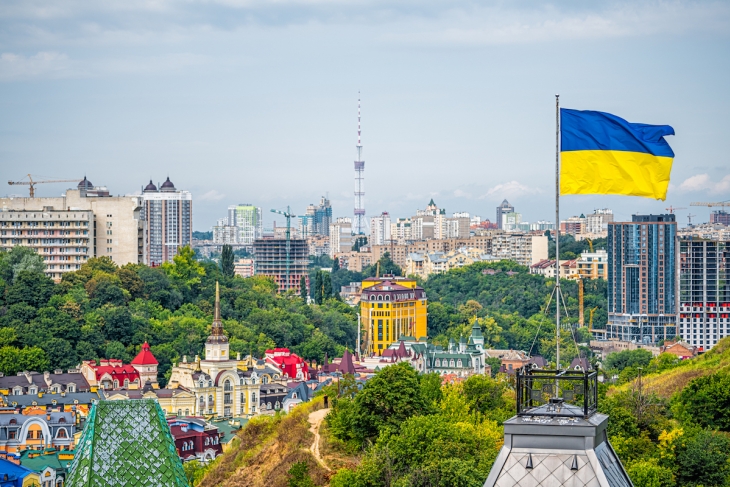We’re all watching the news and hating what we’re seeing, the one big exception being the patriotic heroism of millions of Ukrainians (and the much smaller but still impressive collection of others who have been traveling to Ukraine to join the fight for freedom).
My granddaughter and I happened to be at the opera in Chicago the other evening, and before they started Tosca, they announced that the opera company contained a number of people with Ukrainian ties, whereupon the curtain opened and a mighty chorus sang the Ukrainian national anthem, the (English) words of which bear attention, including the attention of U.S. civics educators:
The glory and freedom of Ukraine has not yet perished
Luck will still smile on us brother-Ukrainians.
Our enemies will die, as the dew does in the sunshine,
and we, too, brothers, we'll live happily in our land.
We’ll not spare either our souls or bodies to get freedom
and we’ll prove that we brothers are of Kozak kin.
Observe in that anthem the pride in country, the willingness to fight, the love of freedom, the unabashed patriotism—and pause to wonder why so many Americans in the education realm, including many K–12 and university educators, are squeamish about those heartfelt sentiments when it comes to their own land. It wasn’t just Trump and MAGA. This attitude arose long before.
While we cheer on the Ukrainians and do what we can to assist from far away (perhaps send money, perhaps urge our own government to do more), we might ask whether it’s also time for a reckoning in the education of young Americans, a reckoning that undoes the squeamishness about patriotism without succumbing to the craziness of jingoism.
In the aftermath of 9/11 and on some of its anniversaries, we at Fordham mustered colleagues around the country to focus on such things. Sure, that was more about the threats of terrorism than the depredations of Putin and his ilk. But at some level, state-sponsored terrorism merges with state-sponsored imperial-style conquest. And today’s kids need education about this much as yesterday’s needed to understand why the World Trade Center was attacked and how (and why) to see that it doesn’t happen again.
More recently, Mike Petrilli and I were pleased to organize and co-edit How to Educate an American: The Conservative Vision for Tomorrow’s Schools. Several of the essays included therein, including superb pieces by Eliot Cohen, Bill Damon, and Jonah Goldberg, deal with history and civics and patriotism in the context of K–12 education.
Several of the admirable recent pushes by other groups and organizations to revive and revitalize civics education would also, whether the authors acknowledge it or not, give young Americans at least a solid foundation atop which informed patriotism can comfortably lodge. But public education across much of the U.S. has a very long way to go before it can be said even to supply the fundamental knowledge, skills, and dispositions of citizenship. That, sadly, was a major finding of Fordham’s recent review of state standards for civics and U.S. history.
The present nightmare in Ukraine also recalled to my mind the period after the Berlin wall fell when I was privileged to join a group sponsored by the American Federation of Teachers and personally led by the late Albert Shanker. We traveled about Eastern Europe—Hungary, Czechoslovakia (as it still was), Hungary, and Romania, in my case—giving talks and seminars for teachers on “education for democracy.” Those teachers had for decades been forbidden to tackle such topics in their classrooms and they hungered for both content and encouragement.
The Shanker Institute website today offers a proper account—titled “Fighting for Freedom Around the World”—of Al’s and the AFT’s tireless work in this realm, perhaps the noblest and farthest-reaching of his many legacies and work that we at Fordham were proud to contribute to.
Educating for democracy may be a challenge in tomorrow’s Ukraine, too, but we can be confident that Ukrainian teachers and their fellow citizens will do their utmost to keep that flame burning. Read their national anthem again and you’ll know why.
May God give them strength in this time of peril. And may our country help them to prevail.


